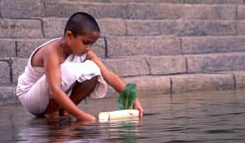WATER
reviewed by
DAN STEFIK
________________
 It
would be difficult to deny that some of the most important films
in history are those whose ideas, whether overtly politically
motivated or not, continue to lay claim to some sort of contemporary
relevance because they were originally conceived as ‘movies
of the moment.’ Some directors feel the moment is best
preserved and represented in the documentary format (Michael
Moore’s Fahrenheit 911). Others choose to fictionalize
the moment. An outstanding example of the latter is Gillo Pontecorvo’s
The Battle of Algiers (1965). By capturing the essence
of a brutally oppressive colonial regime and what is universal
in the human condition, the film is as gripping and engaging
now as it was 40 years ago.
It
would be difficult to deny that some of the most important films
in history are those whose ideas, whether overtly politically
motivated or not, continue to lay claim to some sort of contemporary
relevance because they were originally conceived as ‘movies
of the moment.’ Some directors feel the moment is best
preserved and represented in the documentary format (Michael
Moore’s Fahrenheit 911). Others choose to fictionalize
the moment. An outstanding example of the latter is Gillo Pontecorvo’s
The Battle of Algiers (1965). By capturing the essence
of a brutally oppressive colonial regime and what is universal
in the human condition, the film is as gripping and engaging
now as it was 40 years ago.
Water,
Canadian filmmaker Deepa Mehta’s latest instalment in
her elemental trilogy (Fire 1996, Earth 1998),
touches a raw nerve that certainly qualifies it as a ‘movie
of the moment.’ The film is set in 1938 colonial India.
Its story follows the socially and religiously determined lifestyles
of a group of women residing in a widow’s ashram near
the Ganges River in Varanasi. A young widowed child, Chuyia,
is our entry point into this unfortunate story, while a young
resistant widow, Shakuntala, played by Seema Biswas, of
Bandit Queen fame, is our exit point.
The latter saves Chuyia from the ashram, the brutal and cruel
preserve of archaic values that are at the heart of an outdated,
oppressive religion whose institutional hold is being challenged
by the rise in popularity of Gandhi and nationalism.
 This
is not a great film by any means, but like many interesting
films, it divides spectatorship into highly polarized camps.
Mehta’s film doesn’t lay itself bare enough (in
terms of objectivity) to merit a rigid feminist critique. After
all, this is not history, only her story, a work of cinematic
fiction, which falls more appropriately under the rubric of
a humanist tradition than a feminist one. I think it’s
rather unfortunate that some critics could not see past the
supposed limitations which Mehta imposed on her story; the apparently
deliberate choice to simplify the context in which widowhood
is situated. On the other hand, the politics of the film run
much deeper, so deep in fact that Mehta, to some degree, must
be considered an ‘activist’ filmmaker. Jasmine Yuen-Carrucan,
a clapper loader on the Water film shoot, details
at length the trials and tribulations encountered
by Mehta and her crew in the making of her film. Not only were
there major economic and logistical obstacles, there was resistance
from governments, protesters and activists. To this day, the
film is verboten in India.
This
is not a great film by any means, but like many interesting
films, it divides spectatorship into highly polarized camps.
Mehta’s film doesn’t lay itself bare enough (in
terms of objectivity) to merit a rigid feminist critique. After
all, this is not history, only her story, a work of cinematic
fiction, which falls more appropriately under the rubric of
a humanist tradition than a feminist one. I think it’s
rather unfortunate that some critics could not see past the
supposed limitations which Mehta imposed on her story; the apparently
deliberate choice to simplify the context in which widowhood
is situated. On the other hand, the politics of the film run
much deeper, so deep in fact that Mehta, to some degree, must
be considered an ‘activist’ filmmaker. Jasmine Yuen-Carrucan,
a clapper loader on the Water film shoot, details
at length the trials and tribulations encountered
by Mehta and her crew in the making of her film. Not only were
there major economic and logistical obstacles, there was resistance
from governments, protesters and activists. To this day, the
film is verboten in India.
Despite
the criticism and on-going controversy, Water deserves
to be seen for a number of reasons. It is absolutely stunningly
photographed and the location shooting lends an authenticity
that Hollywood could not possibly hope to replicate. Furthermore,
the film’s ideas and issues provide thought provoking
material which can be investigated outside the highly personalized
context of Mehta’s courageously produced film.